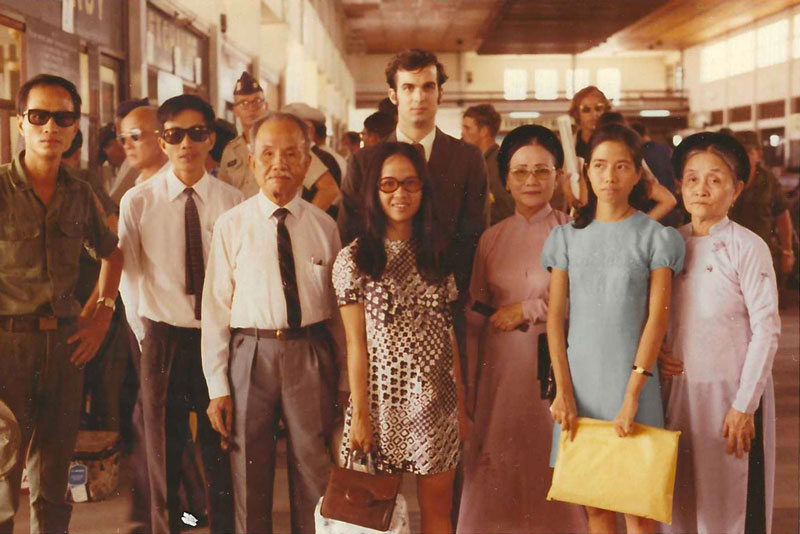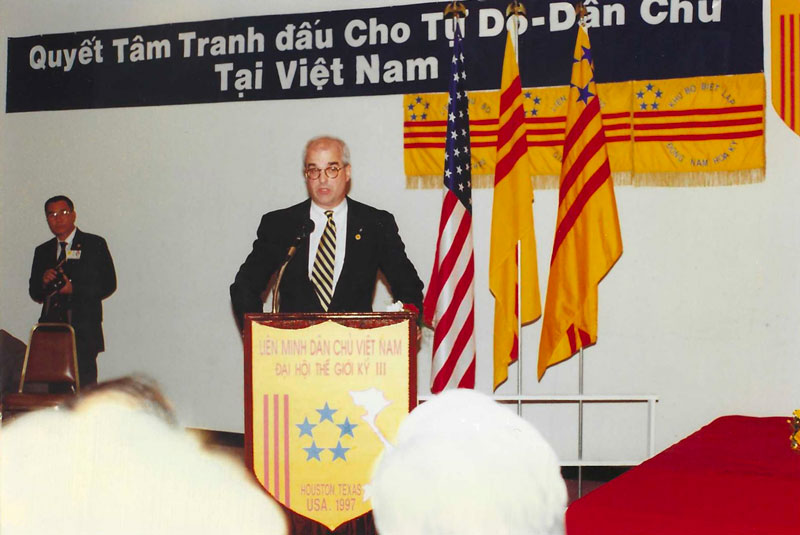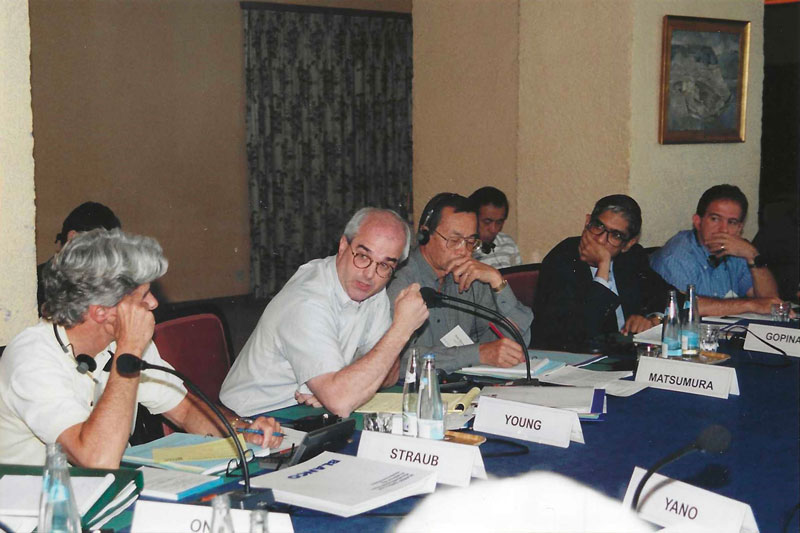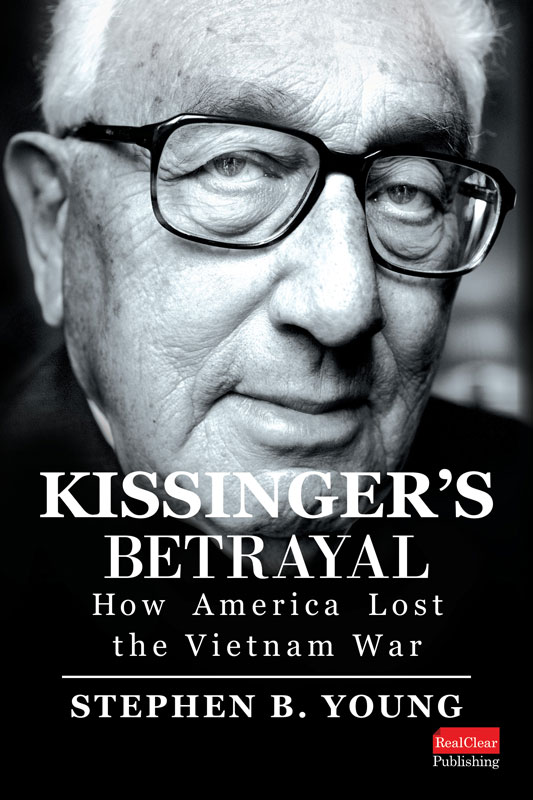Unveils One of the Best Kept Secrets in Recent American History & Restores Dignity To Those In the Path of the Vietnam War
“Arguably the most important single source published in decades for understanding why America went to war in Vietnam, why doing so was important, and what went wrong and ultimately led to a Communist victory.”
—Prof. Robert F. Turner, SJD, former president of the U.S. Institute of Peace, author of Vietnamese Communism: Its Origins and Development, and co-founder of the Center for National Security Law at the University of Virginia
Stephen B. Young’s Story

Stephen B. Young is the global executive director of the Caux Round Table for Moral Capitalism and the author of Moral Capitalism: Reconciling Private Interest with the Public Good, The Tradition of Human Rights in China and Vietnam, and The Theory and Practice of Associative Power: CORDS in the Villages of Vietnam 1967–1972.
Steve’s Dad, Kenneth Todd Young, was President John F. Kennedy’s Ambassador to Thailand. Steve Young learned to speak Thai and traveled out of Bangkok as much as possible. He started a student newspaper at the International School of Bangkok. He graduated from the International School in Bangkok, then went on to Harvard College where his senior honor thesis was on personal identity and political loyalty. He went on to serve in the Vietnam War before returning to finish his training at Harvard Law School.
In college, Steve was mentored by Professor David Riesman on American culture and national character, on modernization of traditional societies by the noted Marxist Barrington Moore, and on the institutionalization of values in political structures by Professor Samuel Huntington.
In Vietnam, after learning Vietnamese at the Vietnam Training Center in Washington DC, Young worked for the US Agency for International Development in the CORDS program of village development and counterinsurgency. He was assigned as a Deputy District Advisory in Vinh Long Province and then as Chief, of the Village Government Branch of CORDS officed in Saigon. Third, he was assigned as the assistant to the Minister/Counselor for Economic Affairs in the American Embassy.
Young married Pham Thi Hoa in 1970. He and Pham translated from Vietnamese the novel about Ho Chi Minh published as The Zenith. His 1968–1971 service in Vietnam for the US Agency for International Development in village development and counterinsurgency was highly praised by President Richard Nixon, Central Intelligence Agency Director William Colby, and ambassador to Saigon Ellsworth Bunker.

In 1975 and again in 1978, Young took a lead in successful efforts to resettle refugees from South Vietnam, Laos, and Cambodia in the United States. For many years Young was a confidant of Nguyen Ngoc Huy, the founder of the Tan Dai Viet Nationalist political party in South Vietnam.

In 1980, Ellsworth Bunker, the former American Ambassador in Saigon, Republic of Vietnam, asked Young to assist him in writing personal memoirs of his service in that position. Young was thus privileged to have access to secret government documents about the Vietnam War.
In 1989, as a former member of the Council on Foreign Relations, he proposed the formation of a United Nations interim administration for Cambodia to finally put an end to the Killing Fields in that country.
Young also served as an assistant dean at the Harvard Law School and dean and professor of law at the Hamline University School of Law. After stepping down as Dean, Young practiced law in Minnesota. He was a founder and the first Chair of the Center for the American Experiment. He also served on the boards of the Citizens League, the Minnesota Museum of Art, and Vietnamese Social Services. In 1996, he sought the Republican Party nomination to run for the United States Senate.
As a public intellectual, Steve founded the Journal of Law and Religion to inform the study of law with serious consideration of the higher principles which give meaning to our lives. Second, During the impeachment of President Richard Nixon, Steve researched the English precedents for “High Crimes and Misdemeanors” and submitted a report to John Doar, special counsel for the House Impeachment proceedings. Steve’s conclusion that impeachment was a fiduciary proceeding to remove an official for abuse of public trust was included in the Articles of Impeachment of Richard Nixon and later in the Articles of Impeachment of Donald Trump.

In 2001, Young became Global Executive Director of the Caux Round Table for Moral Capitalism. He published Moral Capitalism, a book integrating the financial dynamics of capitalism with moral engagement with stakeholders. Sandra Waddock listed Young as one of the 23 persons who made the corporate social responsibility movement in her book The Difference Makers.Young continues to serve in this position and edits the Round Table’s monthly newsletter. He recently coordinated an effort to study the long-overlooked Covenants given by the Prophet Muhammad to respect and protect Christians, an initiative endorsed by Pope Francis.
Subscribe to Steve’s Substack
“A newsletter about moral capitalism”
Book
For five decades, conventional wisdom about the Vietnam War has been that it was lost because it never could have been won. South Vietnam was doomed to defeat. The American effort was a foreign intrusion forever incapable of winning the “hearts and minds” of the South Vietnamese people.
But what if South Vietnam was defeated not because of its own shortcomings but because it was betrayed by a secret deal made behind its back? Deeply researched and compellingly argued, Kissinger’s Betrayal uses once-secret files of the American ambassador to South Vietnam and long-overlooked documents from official government archives—including the foreign ministry of the Soviet Union—to reveal for the first time how Henry Kissinger personally and secretly schemed to irrevocably compromise South Vietnam’s chances for survival.
Without informing his president, other American leaders, or US allies in South Vietnam, Kissinger unilaterally made a horrendous—and ultimately completely unnecessary—diplomatic concession that allowed Communist North Vietnam to leave its army inside South Vietnam and then freely resume its war of invasion and conquest at a time of its own choosing.
In an unprecedented account, historian and global executive director of the Caux Round Table for Moral Capitalism Stephen B. Young provides new insight into both genuine Vietnamese Nationalism and the French colonialism that marginalized and decentered the right of the Vietnamese people to live freely in an independent country of their own choosing.
Kissinger’s Betrayal reveals a fresh and more truthful history of the Vietnam War that restores dignity to America as well as the people of Vietnam.
“While reading the book Kissinger’s Betrayal by Stephen Young, I was taken aback and moved by the thoughtful understanding on the part of an American of the national feelings of Vietnamese. I (along with the spirit of my late husband and also, I believe, in accord with millions of other Vietnamese) thank Stephen Young for his efforts.
With high regard, I recommend this book to every Vietnamese—whether inside Vietnam or overseas; Communist and non-Communist—in order to seek out the origins, put aside ideologies, and understand the national spirit of the Vietnamese that we have sustained for thousands of years.”
—Nguyen Tuong Nhung, wife of Lieutenant General Ngo Quang Truong of the Army of the Republic of Vietnam; daughter of Nguyen Tuong Vinh (pen name Thach Lam); niece of Nguyen Tuong Tam (pen name Nhat Linh)
I first met Steve Young more than half a century ago when I was an Army captain on detail to the American embassy in Saigon as an expert on Vietnamese Communism. Steve was an extraordinary figure even then, held in the highest esteem by Ambassador Ellsworth Bunker and Deputy CORDS Director Bill Colby. The reason was clear—few if any Americans in Vietnam at the time rivaled his in-country experience and extraordinary command of Vietnam and its language and culture. After the war, he distinguished himself as a legal scholar and dean at Harvard and other law schools and in the private sector. Honorable people can disagree about the relative American contributions to that outcome—and Robert McNamara, the news media, Congress, and John Kerry certainly played notorious roles—but it is difficult to read the once highly classified documents disclosed in this landmark study without concluding Henry Kissinger betrayed his public trust and contributed to the deaths of millions of South Vietnamese and Cambodians and the loss of freedom for countless more. This book is highly recommended for scholars, students, policymakers, and the public alike seeking to understand this important if painful part of our history. Failing to understand the lessons of history would add to the tragedy. Kissinger’s Betrayal is arguably the most important single source published in decades for understanding why America went to war in Vietnam, why doing so was important, and what went wrong and ultimately led to a Communist victory.”
—Prof. Robert F. Turner, SJD, former president of the U.S. Institute of Peace, author of Vietnamese Communism: Its Origins and Development, and co-founder of the Center for National Security Law at the University of Virginia
“Stephen Young has produced an account of Vietnam’s tragedy that is as moving as it is erudite. He takes readers inside the mind of a nation that struggled for its distinct national identity against three empires—Chinese, French, and Soviet—and was betrayed by its American ally. He offers a plethora of evidence to show that Vietnamization of the war was succeeding until it was sandbagged. Young combines the inside knowledge of a participant with the precision of a scholar in a persuasive indictment of Henry Kissinger as the author of South Vietnam’s fall to Communism. It is a unique combination of testimony and analysis that stands out in the voluminous literature on the Vietnam War. It is indispensable reading for anyone who wants to understand the troubled history of Southeast Asia as well as the damage that arrogant elitists have inflicted on America’s world standing.”
—David P. Goldman, deputy editor, Asia Times
“In 1973, the Nobel Peace Prize Committee voted to give the award jointly to Henry Kissinger and Le Duc Tho (North Vietnam’s chief negotiator) for the cease-fire agreement that enabled the US to withdraw its forces from South Vietnam. While Kissinger accepted, Le Duc Tho declined. Both were consistent with their public positions. In 1975, the South fell. Had the Peace Prize been awarded in 1975, Kissinger would probably have refused, while Le Duc Tho might have accepted. Stephen Young has told me his account of the Vietnam War and its peace negotiations from years ago. I am glad that he has finally published it with supporting evidence, some only recently available. It is a provocative but important perspective that should be neither ignored nor forgotten by future generations.”
—George Yeo, former Singapore foreign minister
“From a Japanese point of view, this book is a major contribution to our understanding of Asian history. From the first years of the twentieth century, Japan was compassionately supportive of the Vietnamese Nationalists in their struggle against French colonialism and then Communism as a continuing expression of European cultural imperialism. In the 1970s, first as Japanese ambassador to Saigon and later as Japan’s deputy foreign minister, my father felt helpless to do anything but expressed deep sympathy to the government in Saigon. Later, as ambassador to the United States, he maintained the highest respect for, and his friendships with, those Vietnamese whom he had met in Saigon but who were now refugees in America.”
—Kazuhiko Togo, former Japanese ambassador to the Netherlands and visiting professor, Shizuoka University
“The period of the Vietnam War was arguably as divisive for the American polity as is the polarization of today. Time heals, but history reveals. Steve Young has contributed to the history of that divisive epoch by revealing the true cost of peace in this superb volume. There is now evidence that peace might have come earlier to Vietnam but for active interference by Richard Nixon at the end of the Lyndon Johnson administration.”
—J. Brian Atwood, former undersecretary of state, administrator of USAID, and Dean of the Humphrey School at the University of Minnesota
“This book is brilliantly written—concisely sophisticated, substantive in content, and comprehensive. But it is a sad story that reveals how prejudice and dishonesty were given priority over the dignity and credibility of the United States as the pillar of freedom, patriotism, and democracy. South Vietnam was taken for a ride by Henry Kissinger.”
—Kasit Piromya, former Thai foreign minister
Press
Stephen B. Young is available now for interviews and book-related events. Contact us below!








Contact
Want to get in touch regarding Kissinger’s Betrayal? Please enter your contact details and a short message below and we will answer your query as soon as possible.
For press related inquiries, please contact Sky Wilson, Director of Marketing at Amplify Publishing Group, at sky@amplifypublishing.com.

